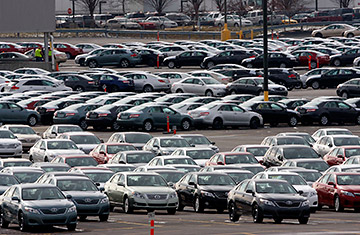
Toyota Camrys and Avalons at a manufacturing plant in Georgetown, Ky.
As automakers tote up their January sales and release the numbers to the public this week, Wall Street analysts will be scrutinizing them more closely than usual with one end in mind: quantifying how badly Toyota has been hurt by its massive accelerator recall and identifying exactly which automakers are the most likely beneficiaries of it.
It is not an easy call. Popular opinion would suggest that Ford could pick up a lot of customers who either are worried about Toyota's problems or simply aren't able to get the vehicle they want because sales have been halted. Ford has been the subject of enormously favorable news coverage this year, ranging from vehicle awards to headlines celebrating its return to profitability — Ford is the only U.S. automaker to report an annual profit in the past several years.
But an analysis by Goldman Sachs suggests that while Ford is expected to gain some market share in the months ahead, Toyota will contribute relatively little. "We continue to view Chrysler and GM as being the largest source of share gains," it states, adding, "We expect a modest gain against foreign brands."
The reason is that there is surprisingly little interaction between domestic and import customers. Import buyers tend to be younger, more affluent and better educated than their domestic counterparts, and shop at different dealerships. They shop for quality and value. Despite Ford's recent rise, its image hasn't yet caught up with its performance.
An analysis by Edmunds.com, an online car-shopping service, reaches a similar conclusion. When looking at the most likely alternatives to Toyota's Camry, Corolla and RAV4 — the automaker's three most popular models — Edmunds comes up with six import competitors and just three domestic ones: two Chevies and a Ford.
Who is most likely the biggest beneficiary of Toyota's accelerator recall? Its longtime rival Honda. "We see Honda as being the best positioned across a broad range of vehicles to gain," write analysts from Deutsche Bank. "Honda competes at or near the top of the market in five impacted segments, models which account for 80% of sales."
Ordinarily, Honda would have a hard time capitalizing on any rival's misfortune, because it maintains some of the smallest inventories in the industry, allowing it little room for an unexpected sales surge.
But it ended 2009 with a 74-day supply of the Civic and a 68-day supply of the Accord. And indeed, both models were strong performers in January, in what was otherwise a subpar month. So the automaker not only gets an opportunity to reap a windfall in sales; it also can liquidate excess inventory without adjusting production levels or resorting to incentives. Supplies of its Pilot SUV and Odyssey minivan are about normal, and only its popular CRV crossover is in short supply.
Other Asian automakers are likely to gains in specific areas. The popular Mazda 3 should gain some ground in the compact-sedan segment, while the Subaru Legacy could do well in the midsize-sedan category.
But don't look for big gains for Ford, much less General Motors or Chrysler, despite their attempts to woo buyers with special incentive programs. This has all the makings of an Asian-only battle, and Toyota can only stand by and watch as its buyers defect to its Japanese and Korean rivals, with Honda at the head of the pack.
